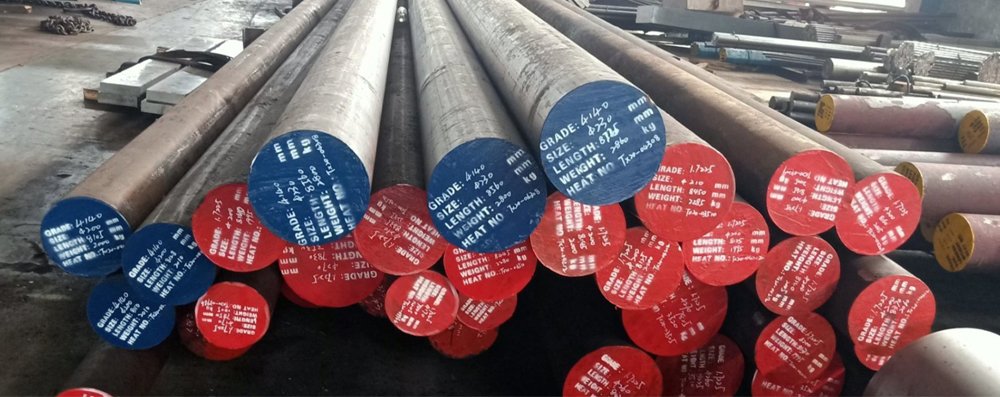Introduction
P20+Ni (also known as DIN 1.2738 or 40CrMnNiMo8-6-4) is a high-quality, nickel-alloyed mold steel developed as an upgrade over standard P20 steel. It is delivered in a pre-hardened condition and is specifically designed to offer excellent through-hardening capabilities, improved toughness, enhanced machinability, and better polishability.
The addition of approximately 1% Nickel allows the material to achieve uniform hardness even in large cross-sections, making P20+Ni highly suitable for high-performance plastic molds, die-casting dies, and various tooling components requiring durability, wear resistance, and dimensional stability.
Properties of P20+Ni Steel:
- Pre-Hardened: Delivered in pre-hardened condition around 30–36 HRC.
- Excellent Through Hardening: Uniform hardness even in large sections.
- High Toughness: Improved impact strength due to nickel content.
- Superior Machinability: Good machinability compared to conventional steels.
- Excellent Polishability and Texturing: Suitable for mirror-finished molds.
- Dimensional Stability: Reduced risk of distortion during machining and service.
- Good Wear Resistance: Ideal for heavy-duty tooling operations.
- Surface Treatment Capability: Can be nitrided or chromed for enhanced performance.
Uses/Applications of the Grade:
P20+Ni finds widespread applications across several industries, including:
- Plastic Injection Molds: Ideal for large and complex molds requiring high surface finish.
- Die Casting Dies: Primarily for low melting alloys like zinc and magnesium.
- Blow Molding Dies: For manufacturing plastic bottles and hollow products.
- Mold Frames and Bases: For multi-cavity and large injection molds.
- Automotive Parts: Molds for headlights, bumpers, and dashboards.
- Tooling Components: Shafts, sleeves, bushings requiring wear and impact resistance.
Chemical Composition:
| Element | Content (%) |
| Carbon (C) | 0.35 – 0.45 |
| Silicon (Si) | 0.20 – 0.40 |
| Manganese (Mn) | 1.30 – 1.60 |
| Chromium (Cr) | 1.80 – 2.10 |
| Molybdenum (Mo) | 0.15 – 0.25 |
| Nickel (Ni) | 0.80 – 1.20 |
| Phosphorus (P) | ≤ 0.025 |
| Sulfur (S) | ≤ 0.005 |
The nickel addition improves toughness and uniformity in hardness across sections.
Mechanical Properties:
| Property | Typical Value |
| Hardness (as delivered) | 30 – 36 HRC |
| Tensile Strength | ~1100 MPa |
| Yield Strength | ~900 MPa |
| Elongation at Break | ~12% |
| Impact Toughness | High |
These properties ensure the material’s robustness under mechanical and thermal stresses.
Physical Properties:
| Property | Typical Value |
| Density | 7.85 g/cm³ |
| Modulus of Elasticity | 205 GPa |
| Thermal Conductivity | ~29 W/m·K at 20°C |
| Coefficient of Thermal Expansion | 12.3 × 10⁻⁶ /°C (20–100°C) |
| Specific Heat Capacity | ~460 J/kg·K |
Forging:
- Forging Temperature Range: 1050°C – 850°C.
- Cooling Method: Slow cooling in furnace or dry ash to prevent cracking.
- Precautions: Avoid overheating and rapid cooling to maintain microstructural integrity.
Proper forging practices ensure enhanced mechanical performance.
The thermal properties allow P20+Ni to perform reliably in dynamic and high-temperature environments.
Heat Treatment:
P20+Ni is supplied pre-hardened but can undergo further treatments for improved surface properties:
- Stress Relieving: After rough machining, heat to ~550–650°C, hold for 1–2 hours, then cool slowly.
- Nitriding: Achieves a surface hardness up to 60–65 HRC, enhancing wear resistance while preserving core toughness.
- Tempering: If re-hardening is performed, appropriate tempering is required to achieve balanced mechanical properties.
Heat treatment enhances the material’s durability for critical mold-making applications.
Dimensional Tolerances:
Bright bars and forged forms are available in precise dimensional tolerances:
- Round Bars: h9 or h11 tolerance class.
- Plates: Thickness tolerance typically ±0.30 mm.
- Customized Sizes: Available on request as per customer drawings.
Tight tolerances ensure reduced machining time and higher mold accuracy.
Machinability:
- P20+Ni offers good machinability (around 75% relative to free-machining steels).
- Suitable for high-speed cutting, milling, drilling, and turning.
- Proper coolant application is recommended to enhance tool life and surface quality.
- Minimal tool wear and high-quality surface finishes are achievable.
Its superior machinability makes it ideal for complex molds and tooling parts.
Weldability:
- P20+Ni exhibits good weldability with proper preheating (~250–300°C) before welding.
- Post-weld stress relieving (at ~600°C) is strongly advised to prevent cracking.
- Low-carbon consumables matching the base hardness should be used.
Good welding practice ensures the retention of toughness and dimensional stability.
Corrosion Resistance:
- P20+Ni has moderate corrosion resistance but is not stainless.
- Suitable for molds used in dry or controlled environments.
- Surface protection methods such as nitriding, chrome plating, or coatings are recommended for applications exposed to moisture.
- Regular maintenance extends service life.
Available Form:
P20+Ni Steel is commercially available in various standard forms:
- Bright Bars (Round, Hexagonal, Square)
- Forged Bars (Rounds)
- Flat Bars and Blocks
- Plates and Die Steel Sheets
- Customized Pre-machined Mold Blocks
This versatility meets a broad range of manufacturing and tooling needs.
Conclusion:
P20+Ni is a premium mold steel offering significant advantages over conventional P20 steel. Its nickel content improves toughness, hardness uniformity, and machinability, making it the material of choice for high-performance mold-making applications, especially large, complex molds requiring fine surface finishes and dimensional stability.
With excellent through-hardening ability, good polishability, reliable machinability, and moderate corrosion resistance, P20+Ni is a comprehensive solution for mold makers and tooling engineers striving for superior performance and durability. Proper processing and surface treatment further enhance the steel’s life span and functionality.
Related Products : D2, DB6, DIN 1.2714, DIN 1.2080, DIN 1.2379, DIN 1.2343, DIN 1.2344, EN31, H11, H13, OHNS, HCHCR, M2, P20+S, P20, P20+Ni, K310, Maps


